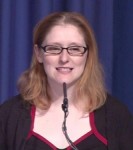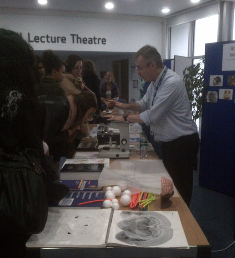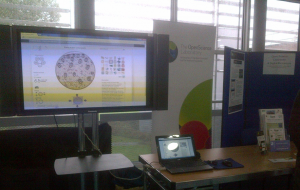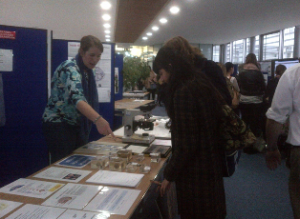
I was recently involved in the organisation of an event for local secondary school pupils for the Society for Biology’s ‘Biology Week’ initiative supported by The Physiological Society. The purpose of Biology Week is to celebrate all aspects of the biosciences. We set up a series of interactive displays and lectures and a dedicated online resource available through OpenLearn.

![]()
Pupils were able to chat with active research scientists and engage with interactive activities, including having the opportunity to look at slices of real brain tissue down a microscope and watch the electrical signals of EEG recordings. There was also the opportunity to have a go at the activities within the Open Science Laboratory and learn about iSpot.

The students also attended four lectures covering a range of biological topics:
- Dr James Phillips discussed how technologies such as stem cells and tissue engineering can be combined to build all kinds of replacement tissues with the potential to repair damage caused by injury or disease.
- Dr Claire Turner talked about our sense of smell and how we can use this highly developed sense in dogs, rats and bees to diagnose diseases in people.
- Dr Vicky Taylor described the impact of diet and how the diet of our parents and grandparents can affect our health.
- Dr David Robinson shared his experiences of communication through broadcast media, and specifically the BBC, producing high-quality scientific programmes for radio and television.
For a small group of pupils, we also arranged a laboratory tour in the Dept of Life, Health and Chemical Sciences, where they could get to grips with some of the techniques used in a biology laboratory.
Planning and preparation
Preparing for the event was very straightforward because we have put on previous events of this kind before. This year I decided not to be one of the speakers but to focus my efforts on organisation, so that I could apply for external funding to support the event.
The first thing was to recruit speakers. Some speakers had contributed to similar events in the past but others had less experience. This seemed to be a sensible balance, because those newer to engaging with school students could be supported by their colleagues. I also felt that we need to emphasise that the biosciences are something everyone can be engaged with and that careers in biology do not simply involve being in a laboratory day in day out. For this reason it was important to me to have stands from the Open Science Laboratory and iSpot, as well as having David’s talk about the media and science.

Once I had a programme in place, together with Dr Kerry Murphy, I applied to The Physiological Society for funding to support the event and, particularly, to cover the cost of filming the talks so that these could be posted online afterwards.
Once we had a date and talk titles, I wrote to about 60 schools in the vicinity of Milton Keynes and waited for the bookings to come in! I also went through existing material on OpenLearn to identify resources that linked to the talks being given and brought them together on a dedicated Biology Week webpage, which the OpenLearn staff created for me.
After the event, I analysed the feedback from teachers and students, which was very positive. The vast majority of pupils found the material on the displays and stands accessible and interesting. The most popular display was in the area of Brain and Behaviour, where there were real brain samples to examine and the opportunity to make a brain cell from pipe cleaners! The lectures were pitched to build on what students knew already; this balance seemed to be achieved, with the majority of lectures covering some or mostly new material but not all new material. Teachers suggested more opportunity for laboratory tours and follow-up contacts would be appreciated, something I am currently investigating.

As an academic working in the biosciences, I think it is really important to engage with local pupils and to offer a longer lasting resource. As do many academic staff members, I regularly go into schools to talk to students about my area of research, but I feel that this is often a ‘one hit wonder’ and that anything that can be done to have a lasting impact would be beneficial. For this event, I hope we have achieved this by producing a web resource that will include the videos of the lectures and by creating links with local schools that we can build on in the future.
